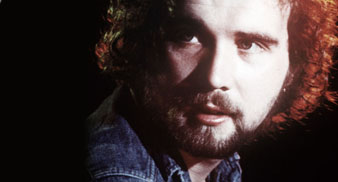It’s ironic that John Martyn’s final live shows, late last year, found him performing his classic 1980 album Grace & Danger in its entirety, as the singer-songwriter had constantly spoken of his reluctance to dwell on the past. He’d previously excused himself from any involvement in the obligatory deluxe edition reissue of the record in 2007, and had taken a similarly hands-off approach to last year’s career-spanning box set Ain’t No Saint.
“I tend to stay away from back catalogue stuff in general,” he said last summer. “I like to focus my energies on what I’m doing now and in the future.” He revealed that he’d amassed about two albums’ worth of new material, and still harboured a desire to collaborate with his “all-time favourite” musician, jazz saxophonist Pharoah Saunders. “We’d best get on with it before one of us dies, though,” he joked. “He’s 74 now, and I don’t feel too well myself!”
Some of those new recordings may appear soon, on an album tentatively entitled Willing To Work. But for now we’re left with a formidable body of music stretching back 40 years that frequently took sly pleasure in moving the goalposts of both folk and jazz. The first solo white act signed to Chris Blackwell’s fledgling Island Records (paving the way for fellow folkies Nick Drake and Richard & Linda Thompson), he was a bold musical adventurer who embraced technology, applying effects pedals and tape loops designed for electric instruments to his own acoustic guitar. But beyond the envelope-pushing of his melodies and chord structures, Martyn was a lyricist of rare honesty and insight. Of his 23 albums, the most celebrated were arguably 1973’s Solid Air – its title track a loose tribute to his friend Drake – and the aforementioned Grace & Danger, a devastatingly forthright account of the disintegration of his marriage to wife and former singing partner Beverley.
Never the household name he plainly should have been, Martyn arguably made as many headlines away from the music he created. Dogged by drink and drugs problems for a large part of career, he also once suffered a broken neck after his car collided with a cow, split his head open in a swimming accident, and had a leg amputated in 2003 following a bout of septicaemia.
An indication to his standing in the broader musical world came at last year’s BBC Radio 2 Folk Awards, where Martyn was presented with a lifetime achievement award by his friend and erstwhile producer Phil Collins, and performed a short set with a band that included Led Zeppelin’s John Paul Jones. With his death coming so soon after that of Davy Graham, the folk world finds itself reeling from the loss of yet another true maverick and inspirational force.
TERRY STAUNTON


